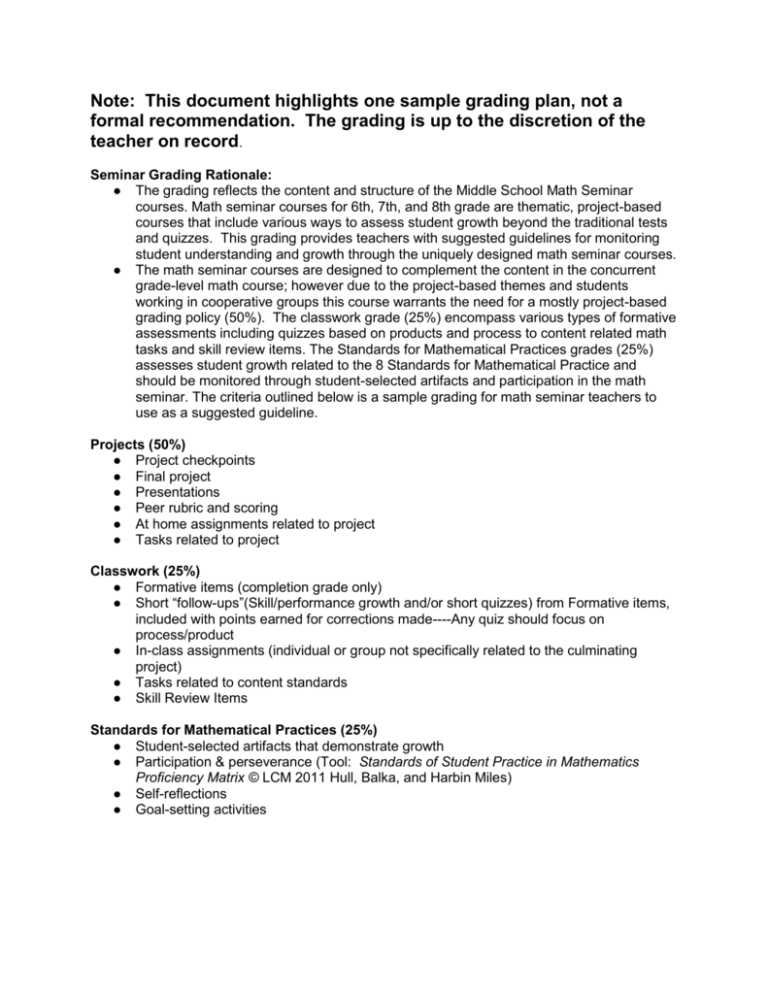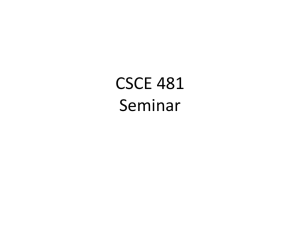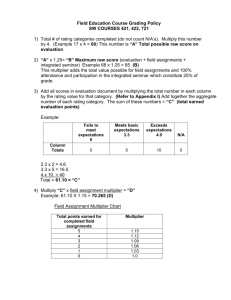Sample Grading Guidelines
advertisement

Note: This document highlights one sample grading plan, not a formal recommendation. The grading is up to the discretion of the teacher on record. Seminar Grading Rationale: ● The grading reflects the content and structure of the Middle School Math Seminar courses. Math seminar courses for 6th, 7th, and 8th grade are thematic, project-based courses that include various ways to assess student growth beyond the traditional tests and quizzes. This grading provides teachers with suggested guidelines for monitoring student understanding and growth through the uniquely designed math seminar courses. ● The math seminar courses are designed to complement the content in the concurrent grade-level math course; however due to the project-based themes and students working in cooperative groups this course warrants the need for a mostly project-based grading policy (50%). The classwork grade (25%) encompass various types of formative assessments including quizzes based on products and process to content related math tasks and skill review items. The Standards for Mathematical Practices grades (25%) assesses student growth related to the 8 Standards for Mathematical Practice and should be monitored through student-selected artifacts and participation in the math seminar. The criteria outlined below is a sample grading for math seminar teachers to use as a suggested guideline. Projects (50%) ● Project checkpoints ● Final project ● Presentations ● Peer rubric and scoring ● At home assignments related to project ● Tasks related to project Classwork (25%) ● Formative items (completion grade only) ● Short “follow-ups”(Skill/performance growth and/or short quizzes) from Formative items, included with points earned for corrections made----Any quiz should focus on process/product ● In-class assignments (individual or group not specifically related to the culminating project) ● Tasks related to content standards ● Skill Review Items Standards for Mathematical Practices (25%) ● Student-selected artifacts that demonstrate growth ● Participation & perseverance (Tool: Standards of Student Practice in Mathematics Proficiency Matrix © LCM 2011 Hull, Balka, and Harbin Miles) ● Self-reflections ● Goal-setting activities Sample Math Seminar Grading Information for Parents This grading plan reflects the content and structure of the ____________________ Middle School Math Seminar course. This math seminar course for ______ grade is a thematic, project-based course that include various ways to assess student growth beyond the traditional tests and quizzes. This math seminar course is designed to complement the content in the concurrent __________________ grade-level math course. Due to the project-based themes and students working in cooperative groups this course warrants the need for a mostly project-based grading policy consisting of 50%, a classwork grade of 25%, and a Standards for Mathematical Practices grade of 25%. Project/Project-related Assignments (50%) Projects/Project-related assignments include all activities related to the thematic unit including, tasks, checkpoints, at home and in class assignments, and presentations. Classwork (25%) Classwork encompass various types of formative assessments including quizzes based on products and process to content related math tasks and skill review items Standards for Mathematical Practices (25%) The Standards for Mathematical Practices assesses student growth related to the 8 Standards for Mathematical Practice and will be monitored through student-selected artifacts and participation in the math seminar.








